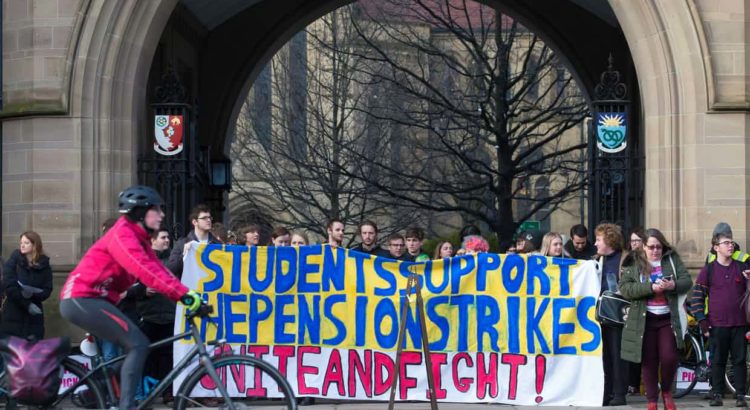Europa/ReinoUnido/TheGuardian
Resumen: Decenas de miles de profesores universitarios en disputa por los cambios en sus pensiones se han declarado en huelga en el primero de los 14 días de acción industrial que amenaza con provocar una interrupción generalizada en los campus de todo el Reino Unido. La Universidad y Unión Universitaria (UC), que representa a los conferenciantes en huelga, estima que más de un millón de estudiantes en 64 universidades se verán afectados por las huelgas, que se extienden durante un mes, con la pérdida de más de medio millón de enseñanza horas. Los primeros informes de las sucursales de UCU afirmaron que hubo una buena participación en los piquetes a pesar del clima helado. Para muchos fue su primera vez en una línea de piquete, incluyendo estudiantes solidarios con sus maestros. Una encuesta de YouGov realizada en vísperas de la huelga sugirió que la mayoría de los estudiantes apoyan la acción industrial -a pesar del inevitable impacto en sus estudios- y creen que las universidades son las principales culpables. En general, tres quintas partes de los estudiantes (61%) dijeron que apoyaban las huelgas; la mitad (50%) culpó a los empleadores de la universidad por la disputa que condujo a la acción industrial del jueves; uno de cada cinco (20%) pensaba que el personal y las universidades tenían la misma culpa; y 2% culparon a sus profesores. La huelga parece ser una de las mayores disputas sindicales desde que el gobierno endureció la acción industrial con nueva legislación. La presión ha estado aumentando en Universities UK, que representa a los empleadores universitarios, para volver a la mesa de negociaciones.
Tens of thousands of university lecturers in dispute over changes to their pensions have walked out on strike in the first of 14 days of industrial action that threatens to bring widespread disruption to campuses across the UK.
The University and College Union (UC), which represents the striking lecturers, estimates that more than a million students in 64 universities will be affected by the walkouts, which are spread over a month, with the loss of of more than half a million teaching hours.
Early reports from UCU branches claimed there was a good turnout on picket lines despite the freezing weather. For many it was their first time on a picket line, including students standing in solidarity with their teachers.
A YouGov poll conducted on the eve of the strike suggested that a majority of students support the industrial action – despite the inevitable impact on their studies – and that they think universities are most to blame.
Overall, three-fifths of students (61%) said they supported the strikes; half (50%) blamed the university employers for the dispute that led to Thursday’s industrial action; one in five (20%) thought staff and universities were equally to blame; and 2% blamed their lecturers.
The strike looks set to be one of the biggest union disputes since the government made industrial action harder with new legislation. Pressure has been mounting on Universities UK, which represents university employers, to return to the negotiating table.
The universities minister, Sam Gyimah, tweeted: “For the sake of students and the reputation of our Universities, @ucu and @UniversitiesUK need to find a way through this damaging and avoidable impasse ASAP.”
The Labour leader, Jeremy Corbyn, released a YouTube message of support to striking lecturers.
UCU members are striking because they claim that proposed changes to the vast Universities Superannuation Scheme will leave a typical lecturer almost £10,000 a year worse off in retirement, with younger academics facing the potential loss of almost half of their total retirement income.
UUK say the pension scheme is in deficit and the only way to make it sustainable is to change it from a defined benefit scheme, giving members a guaranteed income in retirement, to a defined contribution scheme, where pensions are subject to changes in the stock market.
The UCU insists the existing scheme is performing well and UUK’s determination to push through the changes, and refusal to compromise, has left them no alternative but to strike.
The UCU general secretary, Sally Hunt, who was due to address a rally at Goldsmiths, University of London, said: “This poll shows it is quite clear who students think is to blame for the strikes at universities. We have been overwhelmed by the support we have received from students and want to assure them we are doing all we can to get this dispute resolved.
“The universities’ refusal to negotiate with us has caused this mess and they owe it to students to start negotiating properly.”
A UUK spokesman said: “Negotiations between UCU and UUK have been ongoing for the past year. The deadline accepted by both parties for making a decision was extended twice.
“During this period, UCU has unfortunately been unable – or unwilling – to alter its position. Unfortunately, the union refuses to accept the seriousness of the financial challenges facing the scheme and the possible consequences for universities and jobs if costs aren’t controlled.”
Fuente:https://www.theguardian.com/education/2018/feb/22/lecturers-begin-14-day-strike-over-pensions






 Users Today : 264
Users Today : 264 Total Users : 35459859
Total Users : 35459859 Views Today : 438
Views Today : 438 Total views : 3418410
Total views : 3418410